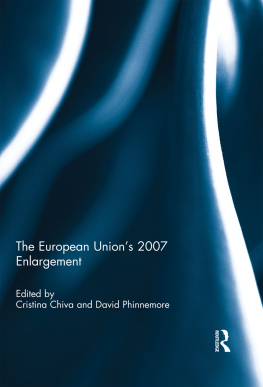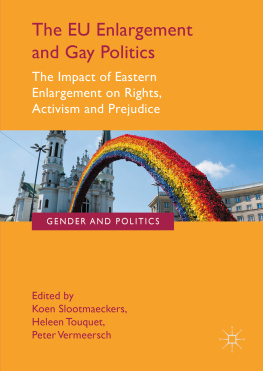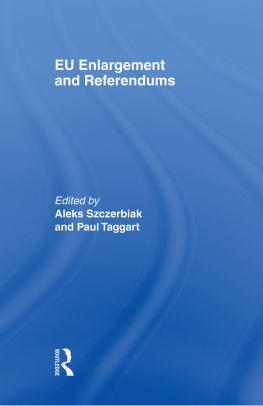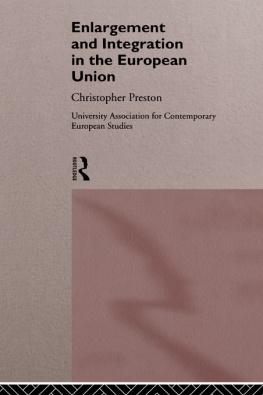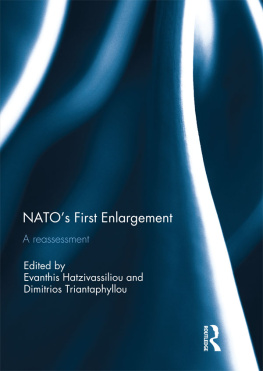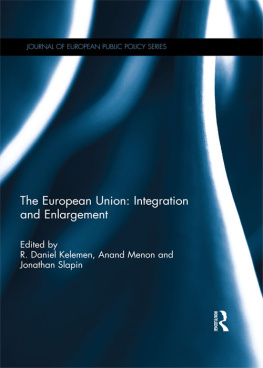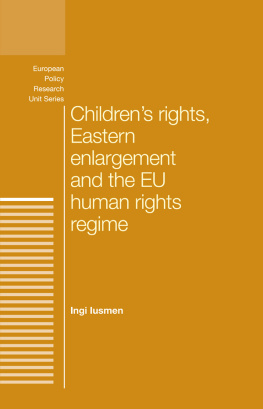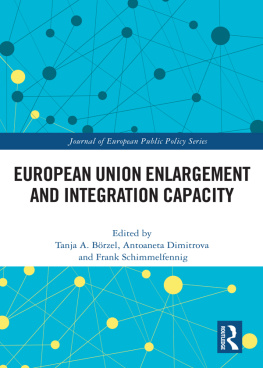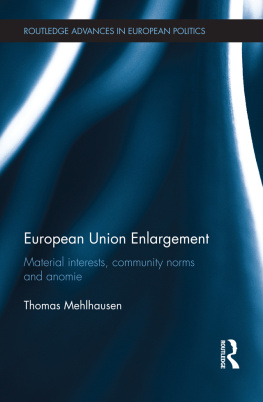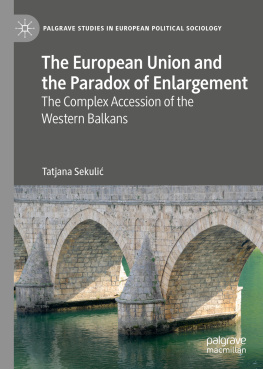The European Unions 2007 Enlargement
This book fills a significant gap in recent literature on European Union politics by examining the EUs other eastern enlargement, completed in 2007 with the accession of Bulgaria and Romania. It focuses on both the process and the effects of the 2007 enlargement within the wider context of the post-communist countries accession to the EU, and, more broadly, within the context of the history of EU enlargement. The book brings together in-depth analyses of a wide range of issues, both from a comparative perspective and through single case studies. Individual contributions shed new light onto EU enlargement through a theoretical re-evaluation of the strategic action paradigm, as well as through historical analyses of the 2007 enlargement and of its implications for future EU enlargements. Further insight into the process of EU enlargement is gained through systematic exploration of the impact of accession on policy-making and institutional structures in Bulgaria and Romania. Altogether, the contributions exemplify the multi-faceted nature of EU enlargement and accession, as well as the extent to which the process of acceding to the EU is not completed with membership, either for the EU or for the candidate countries.
This book was published as a special issue of Perspectives on European Politics and Society.
Cristina Chiva is Lecturer in European Union Politics at the University of Salford, United Kingdom.
David Phinnemore is Senior Lecturer in European Integration at Queens University Belfast, United Kingdom and Visiting Professor at the College of Europe, Bruges, Belgium.
The European Unions 2007 Enlargement
Edited by
Cristina Chiva and David Phinnemore
First published 2012
by Routledge
2 Park Square, Milton Park, Abingdon, Oxon, OX14 4RN
Simultaneously published in the USA and Canada
by Routledge
711 Third Avenue, New York, NY 10017
Routledge is an imprint of the Taylor & Francis Group, an informa business
2012 Taylor & Francis
This book is a reproduction of Perspectives on European Politics and Society, vol. 10, issue 2. The Publisher requests to those authors who may be citing this book to state, also, the bibliographical details of the special issue on which the book was based.
All rights reserved. No part of this book may be reprinted or reproduced or utilised in any form or by any electronic, mechanical, or other means, now known or hereafter invented, including photocopying and recording, or in any information storage or retrieval system, without permission in writing from the publishers.
Trademark notice: Product or corporate names may be trademarks or registered trademarks, and are used only for identification and explanation without intent to infringe.
British Library Cataloguing in Publication Data
A catalogue record for this book is available from the British Library
ISBN13: 978-0-415-68965-6
Typeset in Times New Roman
by Taylor & Francis Books
Disclaimer
The publisher would like to make readers aware that the chapters in this book are referred to as articles as they had been in the special issue. The publisher accepts responsibility for any inconsistencies that may have arisen in the course of preparing this volume for print.
Contents
Cristina Chiva and David Phinnemore
Dimitris Papadimitriou and Eli Gateva
Kjell Engelbrekt
Ana Maria Dobre
Cristina Chiva
Dimitar Bechev
Erhan ener
David Phinnemore
Liliana Pop
Dimitar Bechev is a Research Fellow at the European Studies Centre, St Anthonys College, University of Oxford.
Cristina Chiva is Lecturer in EU Politics at the School of English, Sociology, Politics and Contemporary History of the University of Salford. She has published work on the representation of women in post-communist Hungary and Romania, on gender and nationalism in Romania and on legislative institutionalisation in Central and Eastern Europe. Her current research focuses on the impact of EU accession on gender equality in post-communist Europe.
Ana Maria Dobre is a Researcher in the Faculty of Social Sciences, University of Leuven, Belgium. She is the author of several publications, including: Romania: From historical regions to local decentralization via the unitary state, in: J. Loughlin, F. Hendriks & A. Lidstrom (Eds) The Handbook of Subnational Democracy in the European Union (Oxford University Press, 2009, forthcoming); Revisiting historical and cultural myths and clichs: The Romanian case of nation-state building, in: R. Detrez & B. Segaert (Eds) Europe and the Historical Legacies in the Balkans (Peter Lang, 2008); and Designing and justifying regional reforms: Lessons from Romania, Policy and Politics, 36(4), 2008.
Kjell Engelbrekt is Associate Professor at the Department of Political Science, Stockholm University, and Senior Lecturer at the Swedish National Defence College. He works in the fields of international relations, ethno-nationalism, democratisation and institution-building, often with a focus on Central and Eastern Europe. His most recent publication, with Jan Hallenberg, is entitled The European Union and Strategy: An Emerging Actor (Routledge, 2008).
Eli Gateva is a PhD candidate, University of Manchester.
Erhan ener is a Lecturer at the Department of International Relations, Eastern Mediterranean University. He holds a BSc from Middle East Technical University and MSSc and PhD degrees from Queens University Belfast. His research is primarily on EU enlargement, EU external relations, TurkeyEU relations and RomaniaEU relations. He is the author of Privileged partnership: An alternative final destination for Turkeys integration with the European Union? published in Perspectives on European Politics and Society (2007).
Dimitris Papadimitriou is Senior Lecturer in European Politics, University of Manchester.
David Phinnemore is Senior Lecturer in European Integration and Jean Monnet Chair in European Political Integration at Queens University Belfast and Visiting Professor at the College of Europe. His main research interests cover EU enlargement and EU treaty reform. His main recent publications include Reflections on European Integration: 50 Years of the Treaty of Rome (Palgrave, 2009) edited with Alex Warleigh-Lack, Romania and the European Union: From Marginalization to Membership (Routledge, 2008) with Dimitris Papadimitriou, The EU and Romania (IB Tauris, 2006), and Understanding the European Constitution: An Introduction to the EU Constitutional Treaty (Routledge, 2006) with Clive H. Church.
Liliana Pop is a Research Fellow in the Institute for the Study of European Transformations at the London Metropolitan University. She is the author of Democratising Capitalism? The Political Economy of Post-Communist Transformations in Romania: 19891991 (Manchester University Press). Her research interests include post-communist transformations and the development of a distinctive approach to the study of domestic and international (global) economy and politics based on the sociology of Pierre Bourdieu.
CRISTINA CHIVA* & DAVID PHINNEMORE**
*University of Salford, UK
**Queens University Belfast, UK

